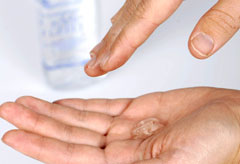Microbicide gel could cut HIV infections by half
A vaginal gel could significantly cut the rate of women contracting HIV from infected partners

A vaginal gel could significantly cut the rate of women contracting HIV from infected partners
Scientists may have found a preventative method to help cut the rate of women contracting HIV from infected partners.
The three-year study, completed by the Centre for the Aids Programme of Research in South Africa (CAPRISA), suggests the vaginal gel could cut infection rates among 889 women by 50% after one year of use, and 39% after two and half years.
Dr. Salim Abdool Karim, one of the leading co-researchers from the University of KwaZulu-Natal in Durban said, ‘We showed a 39% lower incidence of HIV in the tenofovir group.’
New ways of curbing the spread of HIV are desperately needed, particularly in sub-Sahara Africa where nearly 60% of those infected with the virus are women forced to take part in unsafe sex.
The gel, which contains the Aids drug tenofovir, was found to be both safe and acceptable when used once in the 12 hours before sex, and once again in the 12 hours after sex.
After 30 months, the study revealed that only 38 women were infected with HIV in the group provided with the tenofovir gel, compared to 60 women in the control group.
Marie Claire Newsletter
Celebrity news, beauty, fashion advice, and fascinating features, delivered straight to your inbox!
The researchers also concluded, those that used the gel showed a significant reduction in the common sexually transmitted infection, genital herpes, which itself increases the risk of HIV infection.
Dr Karim said, ‘Boy, have we been doing the happy dance.’
Welcoming the results, UN agencies have arranged an expert consultation in South Africa next month to discuss subsequent plans.
Michel Sidibe, executive director of UNAIDS, said the research has given women hope.
‘For the first time we have seen results for a woman-initiated and controlled HIV prevention option,’ he added.
-
 Not quite ready to embrace spring dresses? You need a transitional waistcoat suit
Not quite ready to embrace spring dresses? You need a transitional waistcoat suitA spring-ready take on tailoring
By Jazzria Harris
-
 20 iconic Jennifer Lawrence looks that we can't stop thinking about
20 iconic Jennifer Lawrence looks that we can't stop thinking aboutFrom Dior to Versace, her red carpet and street style moments set the standard for modern Hollywood glamour
By Kim Tran
-
 The viral 75 Medium challenge claims to be a friendlier alternative to the 75 Hard. So what do experts reckon?
The viral 75 Medium challenge claims to be a friendlier alternative to the 75 Hard. So what do experts reckon?Restrictive or effective?
By Katie Sims